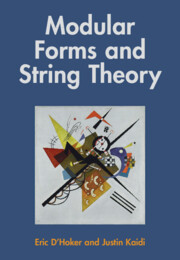Book contents
- Frontmatter
- Dedication
- Contents
- Organization
- Acknowledgements
- 1 Introduction
- Part I Modular forms and their variants
- Part II Extensions and applications
- 10 Hecke operators
- 11 Singular moduli and complex multiplication
- 12 String amplitudes
- 13 Toroidal compactication
- 14 S-duality of Type IIB superstrings
- 15 Dualities in N = 2 super Yang–Mills theories
- 16 Basic Galois theory
- Part III Appendix
- References
- Index
11 - Singular moduli and complex multiplication
from Part II - Extensions and applications
Published online by Cambridge University Press: 28 November 2024
- Frontmatter
- Dedication
- Contents
- Organization
- Acknowledgements
- 1 Introduction
- Part I Modular forms and their variants
- Part II Extensions and applications
- 10 Hecke operators
- 11 Singular moduli and complex multiplication
- 12 String amplitudes
- 13 Toroidal compactication
- 14 S-duality of Type IIB superstrings
- 15 Dualities in N = 2 super Yang–Mills theories
- 16 Basic Galois theory
- Part III Appendix
- References
- Index
Summary
In Chapter 3, we introduced SL(2,Z) as the automorphism group of a two-dimensional lattice with an arbitrary modulus. For every value of the modulus, the lattice also possesses a ring of endomorphisms which multiply the lattice by a nonvanishing integer to produce a sublattice of the original lattice. Multiplying the lattice by an arbitrary complex number gives a lattice that will generally not be a sublattice of the original lattice. However, for special values of the modulus, referred to as singular moduli, and associated special values of the complex-valued multiplying factor, the lattice obtained by multiplication will be a sublattice of the original lattice and the ring of endomorphisms will be enlarged. This phenomenon is referred to as complex multiplication. From a mathematics standpoint, various modular forms take on special values at singular moduli, as illustrated by the fact that the j-function is an algebraic integer. From a physics standpoint, the enlargement of the endomorphism ring has arithmetic consequences in conformal field theory, as illustrated by the fact that conformal field theories corresponding to toroidal compactifications at singular moduli are rational conformal field theories as will be discussed in Chapter 13.
Information
- Type
- Chapter
- Information
- Modular Forms and String Theory , pp. 208 - 222Publisher: Cambridge University PressPrint publication year: 2024
